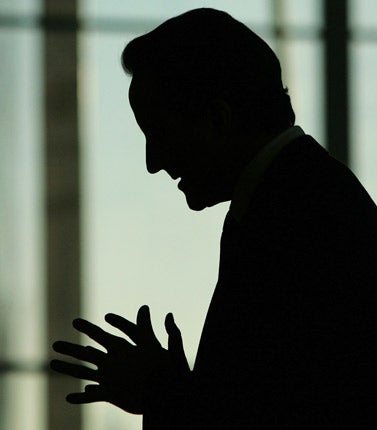Cameron 'uneasy' about judges' privacy rulings

David Cameron hinted yesterday that Parliament may step in and take over the creation of privacy laws from judges. He said Parliament's failure to act has meant judges have used the European Convention on Human Rights to build up privacy law.
His comments come after a number of celebrities used injunctions and super-injunctions to prevent details of their private lives being published.
Asked for his views while he was campaigning in Luton for the local elections, Mr Cameron said: "What's happening here is that the judges are using the European Convention on Human Rights to deliver a sort of privacy law without Parliament saying so.
"I think that we do need to have a proper sit back and think: is this the right thing to happen?
"The judges are creating a sort of privacy law whereas what ought to happen in a parliamentary democracy is Parliament, which you elect and put there, should decide how much protection we want for individuals and how much freedom of the press and the rest of it. So I am a little uneasy about what is happening."
He said: "It might be odd to hear it, but I don't really have the answer to this one, I need to do some more thinking about it. It is an odd situation if the judges are making the law rather than Parliament."
If the Prime Minister follows up his comments, it will be a radical change from the attitude of previous governments, which have consistently avoided trying to draw the line where press freedom ends and an individual's right to privacy begins.
The unspoken attitude of ministers has been that they want a law that will curb tabloid intrusion into private lives, but do not want to be seen to be the ones bringing it in, in case the public thinks they are trying to protect themselves.
Several of the most contentious gagging orders have been issued by Mr Justice Eady, Britain's leading libel judge, who was accused by Paul Dacre, the editor of the Daily Mail, of constructing a privacy law through a series of "arrogant and immoral" judgments.
This week, Mr Justice Eady banned publication of photographs of a TV personality and a woman. The order was unusual because it is contra mundum – meaning that it not only applies to the people with the photographs, but to anybody else who might be offered or get hold of them.
The Liberal Democrat MP John Hemming recently used parliamentary privilege to reveal the existence of a super-injunction obtained by the former head of the Royal Bank of Scotland, Sir Fred Goodwin. Under its terms, it was illegal to name him or even refer to him as "a banker".
Mr Hemming is collecting evidence on super-injunctions to be presented by the Commons Justice Committee.
Recent super-injunctions
* Ban on printing photographs of a TV celebrity issued by Mr Justice Eady, who said they had been used in a "blatant" attempt to blackmail the celebrity. But it appears no charges have been laid.
* Although model Imogen Thomas's six-month affair with a Premier League footballer may be reported, he cannot be named; injunction from same judge.
* News of the World banned from publishing name of entertainer who had an affair with a colleague due to the possible effect on his teenage children. Woman sacked after affair ended.
* Actor who used services of prostitute Helen Wood, whose clients included Wayne Rooney, cannot be named.
Join our commenting forum
Join thought-provoking conversations, follow other Independent readers and see their replies
Comments